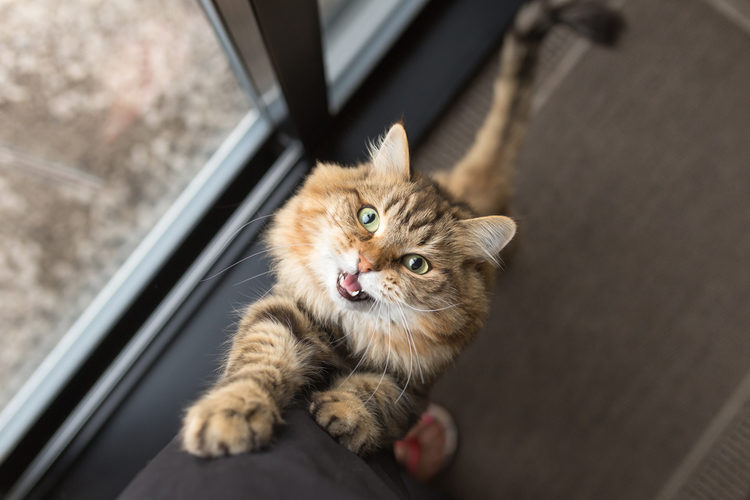Since their domestication several thousand years ago, cats have been eager to get our attention. It’s true! Though many misunderstand them and take them to be standoffish, cats are always communicating with us – or at least trying to, anyway. But when their flicking tails, twitching ears, and longing glances from across the kitchen fail to catch our attention, all felines resort to the same last-ditch effort at getting through to us: they meow.
Well, at least that’s what we call it here in good ol’ North America. But is “meow” the universal term for our favorite feline friends’ vocalizations? How do other cultures explain this phenomenon?
Why Do Cats Meow
 First, let’s understand why cats meow at all, for it is a phenomenon indeed. You may be surprised to learn that cats only meow for our benefit and ours alone. That is to say, they don’t meow to other cats to communicate (other than their mothers very early in life). Rather, they use the tried and true method of… body language (insert Ursula voice here.) Well, that and pheromones. Those sweet kitty pheromones.
First, let’s understand why cats meow at all, for it is a phenomenon indeed. You may be surprised to learn that cats only meow for our benefit and ours alone. That is to say, they don’t meow to other cats to communicate (other than their mothers very early in life). Rather, they use the tried and true method of… body language (insert Ursula voice here.) Well, that and pheromones. Those sweet kitty pheromones.
But why is that? To be blunt, it’s because cats think we’re a little dumb. And I mean, are they wrong? Domesticated cats quickly figure out that we’re a little too, er, unrefined, as it were, to pick up on their subtle kitty social cues. Thus, the meow was invented in order to make their needs known. Food bowl isn’t filled up to the ceiling? Meow. Belly isn’t being rubbed? Bean toes aren’t being worshipped? Inconceivable!
Culture And Linguistics
So now that we know about the behavioral aspect of meowing, it’s time to discover the different ways that the “meow” is perceived. Of course, we understand that the word “meow” is the North American onomatopoeia for the sound cats make at 6 in the morning when they decide they need our attention immediately. However, did you know that this work takes on many forms throughout different cultures?
For instance, let us consider Nyan Cat. A blast from the past, right? You probably haven’t thought about Nyan Cat since it’s conception in 2011. The famous flying rainbow PopTart cat is actually named after the Japanese word for “meow”, which is “nyan”. Pretty cool, eh?
Now, “nyan” might be common knowledge among cat fanatics and Japanese culture enthusiasts, but the plot doth thicken. The first known word for “meow” is the ancient Egyptian word “mau”, which literally translates to “cat”. (Yes, somewhere in the annals of history, an ancient Egyptian person named a cat after the sound it made. Honestly? Pretty practical if you ask me.) And from there on, the theme has pretty much stayed consistent. For instance, “meow” in French is “miaou”, “myau” in Russian, and in many languages such as Spanish, German, and Polish, it’s “miau”.
Etymology
So how did us English-speaking folk come to use the word “meow”? According to the history books, the word “meow” started showing up roundabout 1842, though it is a mystery as to where. Who is the crazy 17th century cat lady we have to thank for this gift to modern language? The world may never know, however, we do know that the word “mew” first appeared in a poem by John Heywood written in 1550. Behold:
“I neuer heard thy fyre once sparke,
I neuer heard thy dog once barke,
I neuer heard once in thy house.
So muche as one peepe of one mouse.
I neuer herd thy catte once mew.
These preises are not small nor few.”
Intriguing indeed, yet perhaps unsurprising that our feline familiars have been inspiring poets since the 1500s, don’t you think? So next time your beloved baby tries enticing you into giving her affection by caterwauling (cat-erwauling?) in your ear, just think – that very same siren song has been the source of many an artistic musing for hundreds of years!







